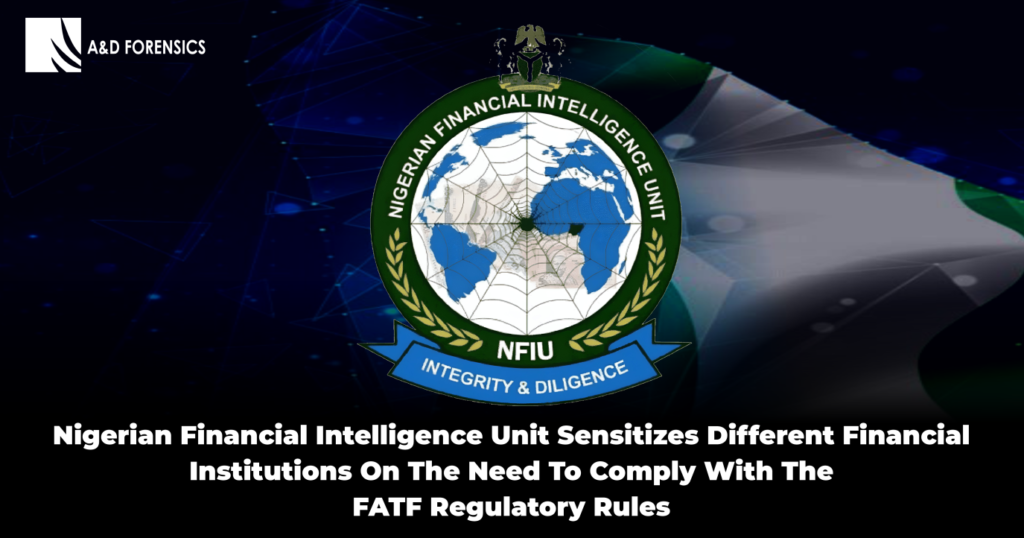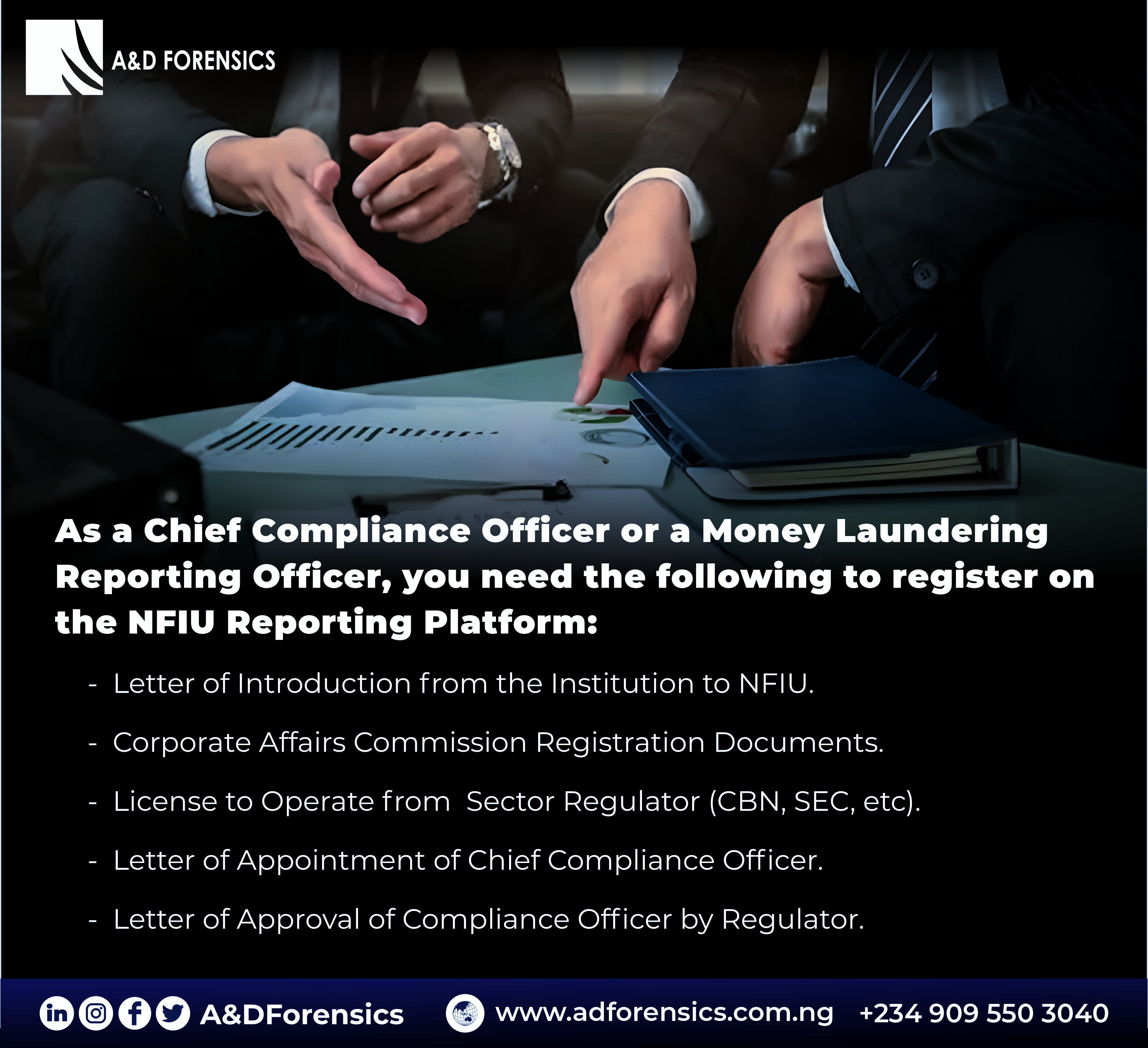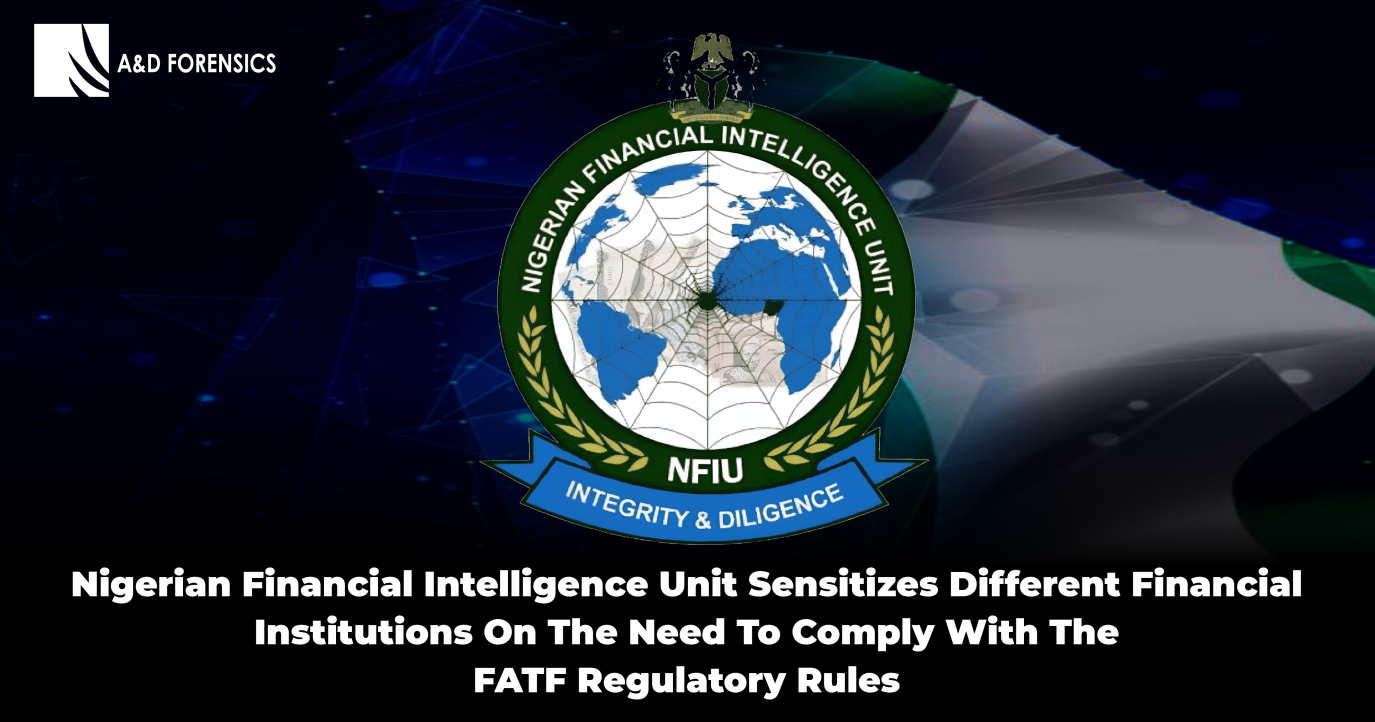The Nigerian Financial Intelligence Unit (NFIU) recently conducted a highly informative session, gathering compliance officers and stakeholders from various financial institutions. The aim was to drive Nigeria’s exit from the FATF Grey List—an important milestone for the country’s financial landscape. Held on May 10th, 2023, this enlightening session took place under the auspices of the Fintech Association of Nigeria’s Forum. Notably, Muhammad Jiya, the Associate Director of the Analysis and Compliance Directorate, delivered a comprehensive presentation on ensuring compliance with FATF regulations and other vital regulatory rules through proper filings to the NFIU.
Hence, in this blog post, we delve deeper into the key takeaways from the NFIU session, emphasizing the crucial role of financial institutions and Fintechs in adhering to compliance standards.

What’s NFIU?
NFIU stands for Nigeria Financial Intelligence Unit. NFIU is the central body in Nigeria responsible for receiving, requesting, analyzing and disseminating financial intelligence reports on money laundering, terrorist financing and other relevant information to law enforcement, security and intelligence agencies, and other relevant authorities.
Here are some facts about the NFIU
- The NFIU operates independently and maintains operational autonomy in carrying out its duties and functions.
- It serves as the Secretariat to the Inter-Ministerial Committee (IMC) on Anti Money Laundering/ Combating the Financing of Terrorism (AML/CFT) coordination of its activities in Nigeria
- The Director/CEO serves as the National Correspondent for Nigeria in the inter-Governmental Action against Money Laundering in West Africa (GIABA).
- In compliance with the provisions of T(P) R 2013 and the NFIU Act 2018, the NFIU fulfills the role of the Secretariat for the Nigerian Sanctions Committee of AML/CFT.
- It currently serves as the headquarters for the Forum of Financial Intelligence Units of GIABA Member States (FFIU-GMs).
- The NFIU has been a member of the Egmont Group of Financial Intelligence Units (FIUs) since 2007, alongside 167 other member entities.
According to the Nigerian Financial Intelligence Unit NFIU Act (2018), NFIU has the following roles:
- Institutionalize best practices in Financial Intelligence Management in Nigeria.
- Strengthen the existing system for combating Money Laundering (ML ) and associated predicate offenses, Financing of Terrorism (FT) and proliferation of weapons of mass destruction.
- Make provision for the NFIU to exchange information with institutions in matters relating to Money Laundering and Terrorist Financing activities.
Reporting Entities
NFIU classified Reporting Entities into:
- Financial Institutions: Examples include: Commercial Banks, Development Finance Banks, Bureau De Change Operators, Microfinance Banks, Finance Companies, Capital Market Operators, Insurance Companies, Primary Mortgage Institutions, Discount Houses, Merchant Banks, Non-interest Banks, VASPs and FinTechs.
- Non-Financial Institutions: Audit Firms, Civil Society Organization, Legal Practitioners, Car Dealers, Clearing and Settlement Companies, Casinos, Hotels, Supermarkets, Luxury Goods Dealers, Chartered Accountants, Jewelries Dealers, Tax Consultants.
What are the Statutory Reports Received By NFIU?
- Currency Transaction Reports (CTR): This refers to the compulsory reporting of Local Currency Transactions by Financial Institutions (FIs), Other Financial Institutions (OFIs), and Designated Non-Financial Institutions (DNFIs), as outlined in Section 11 of the ML(P) Act 2022. The threshold for individuals is set at 5 million naira, while for corporate entities it is set at 10 million naira.
- Suspicious Transaction Reports (STR): This entails the reporting of unusual, unjustifiable, or suspicious transactions by Financial Institutions (FIs), Other Financial Institutions (OFIs), and Designated Non-Financial Institutions (DNFIs) in accordance with Section 7 of the ML(P) Act 2022.
- Cross-Border Reports: This encompasses transactions that involve the movement of money across borders, including activities such as Currency Declaration by Travellers.
- Foreign Transaction Reports (FTR): This refers to the mandatory disclosure of Foreign Currency Transactions by Financial Institutions (FIs), Other Financial Institutions (OFIs), and Designated Non-Financial Institutions (DNFIs) based on threshold requirements stated in Section 3 of the ML(P) Act 2022. The threshold is set at $10,000.00 or its equivalent in any foreign currency.
- Suspicious Activity Reports(SAR): This entails the reporting of any suspicious activity that would not typically trigger a Currency Transaction Report (CTR), Funds Transfer Report (FTR), or Suspicious Transaction Report (STR) by Financial Institutions (FIs), Other Financial Institutions (OFIs), and Designated Non-Financial Institutions (DNFIs) in accordance with Section 7 of the ML(P) Act 2022.
- Additional Information File (AIF): These requests for information are made when analysts require additional details regarding transactions, individuals involved, accounts, or entities.
What Regulatory Returns are Received by NFIU?
In addition to the above, NFIU receives Regulatory Returns which are:
- Politically Exposed Person (PEP): Received Monthly
- Schedule for Training of Employee: Received Annually
- Compliance with Training of Employee: Received Quarterly.
- Testing for adequacy of AML/CFT Compliance: Received Annually.
NFIU Reporting Platform- goAML
NFIU has a reporting platform called the goAML. goAML is a fully integrated software developed by the United Nations Office on Drugs and Crime (UNODC) to be used by financial intelligence units across the world to curb money laundering and terrorist financing.
Hence, goAML acts as a central repository to establish a database of reports on suspicious financial transactions including those from Reporting Entities. It also helps in data collection, management, workflow and statistical needs of any Financial Intelligence Unit. Conclusively, all Reporting Entities, Chief Compliance Officers (CCOs) and Money Laundering Reporting Officers (MLROs) are required to register on the goAML platform.
The goAML Platform has three components namely: goAML Schema, goAML Web and goAML Client.
As a Chief Compliance Officer or a Money Laundering Reporting Officer, you need the following to register on the NFIU Reporting Platform:

- Letter of Introduction from the Institution to NFIU
- Corporate Affairs Commission Registration Documents
- License to Operate from Sector Regulator (CBN, SEC, etc)
- Letter of Appointment of Chief Compliance Officer
- Letter of Approval of Compliance Officer by Regulator.
NFIU NIL Reporting Portal
As a Reporting Entity, MLRO (Money Laundering Reporting Officer), or CCO (Chief Compliance Officer), it is necessary to inform the NFIU if there have been no suspicious transactions on your platform, as failure to do so may result in penalties.
Therefore, the NFIU NIL Reporting Platform is provided by the NFIU for Reporting Entities to submit a NIL Return for a specified Reporting Period when there are no reports to be submitted. If there have been no transactions during the entire week, the Reporting Entity is expected to file a NIL report to the NFIU.
NFIU Feedback Process
The FATF recommendation mandates that the NFIU should provide prompt feedback to Reporting Entities regarding the Suspicious Transaction Reports (STRs) received, ensuring their compliance with reporting obligations.
Hence, NFIU provides feedback to Reporting Entities in two folds:
- Level 1: At this stage, the compliance department of the NFIU thoroughly reviews all Suspicious Transaction Reports (STRs) received through the goAML portal to ensure their completeness.
- Level 2 & 3: In these stages, the feedback provided by the NFIU is derived from tactical and operational analysis conducted on the reported disclosures. This analysis leads to the dissemination of an intelligence report to the competent authorities, initiating further action.
Penalties and Sanctions For Lack of Compliance
The penalties that shall apply for lack of compliance to the regulations shall be prescribed in the relevant extant Administrative Sanctions as provided under MLPPAT, TPPA, TPP Regulations, BOFIA or other laws or regulations.
The following will be the penalties and sanctions:
- Any person who is a Director or an employee of a financial institution that contravenes the provisions of section 3, 5, 5, 6, 7 to 15 of ML (PP) A 2022, commits an offense.
- A person who commits an offense under subsections is liable on conviction to a fine of at least 10,000,000 Naira or imprisonment for a term of at least two years.
- A person found guilty of an offense under the Act may also be banned indefinitely or for a period of 5 years from practicing the profession which provided the opportunity for the offense to be committed.
- Where a body corporate is convicted of an offense under ML(PP)A 2022, the court may order that the body corporate shall be wound up and all its assets and properties forfeited to the Federal Government.
A Path Forward for FinTech Operators and VASPs to Ensure Compliance with NFIU Requirements
The path towards compliance with the Nigerian Financial Intelligence Unit’s (NFIU) AML/CFT requirements holds significant importance for both FinTech operators and Virtual Asset Service Providers (VASPs). To initiate this journey, it is imperative for FinTech operators and VASPs who have not yet registered with the NFIU to prioritize this step. By doing so, you demonstrate your commitment to establishing readiness and adhering to regulatory guidelines.
Consequently, FinTech operators and VASPs are obliged to establish a dedicated compliance team and appoint either a Chief Compliance Officer (CCO) or a Money Laundering Reporting Officer (MLRO). The CCO or MLRO assumes the responsibility of reporting to the NFIU, as elaborated in this article.
For a comprehensive understanding of the additional responsibilities entrusted to the Chief Compliance Officer within your VASP or FinTech establishment, consider enrolling in the Certified Cryptocurrency Compliance Specialist (3CS) Training. This program offers detailed insights into the intricacies of compliance management in the realm of cryptocurrencies and related services. Lastly. You can find further information and enroll in the training here.
Conclusion:
The exponential growth potential of the FinTech industry in Nigeria necessitates a shift in focus from revenue generation to establishing a well-structured national regulatory framework. However, this framework should hold technology companies accountable while fostering innovation and fostering a healthy competitive environment.
Hence, as Virtual Asset Service Providers (VASPs), Web3 startups, and FinTech operators, it is highly recommended to prioritize the provision of training, support, to prevent Anti-Money Laundering (AML), Counter Financing of Terrorism (CFT), and Proliferation Financing (PF) activities. Seeking guidance, training, and collaboration with the Nigerian Financial Intelligence Unit (NFIU) is essential to ensure compliance with AML/CFT regulations.
At A&D Forensics, we specialize in implementing AML/CFT policies and ensuring compliance for Web3 businesses. Please do not hesitate to contact us for any of our comprehensive services here.
Contributor: Loveth Odije






